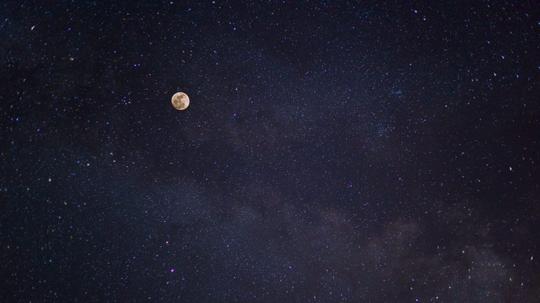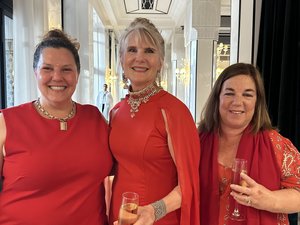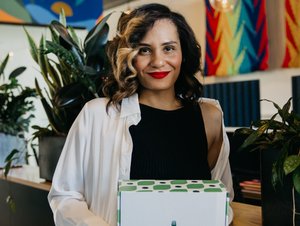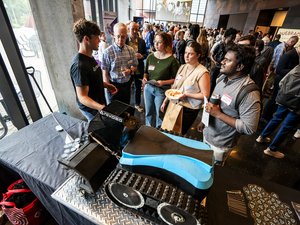
Earlier this year, American Public Media, the parent company of Minnesota Public Radio, announced that it planned to establish Lunar Startups, an incubator for entrepreneurs from underserved or underrepresented communities.
Powered by The Knight Foundation, Lunar will officially launch in September. The operation will be housed in Osborn370, a 20-story building in downtown St. Paul that its investors hope becomes a hub for startups in the Twin Cities. In addition to Lunar, Osborn370 will be home to another accelerator, Techstars Farm to Fork, which is expected to kick off next month.
Lunar Startups will mentor five to seven startups from a variety of industries. The incubator does not take equity in its companies, but asks that they pay a monthly fee of $100 per team member. In exchange, startups receive workspace, mentorship, potential connections to capital and other business benefits.
Prior to joining Lunar Startups, Managing Director Melissa Kjolsing Lynch spent five years leading the Minnesota Cup, the state's largest startup competition. Danielle Steer, Lunar's senior program manager, helped establish Impact Hub MSP, a coworking space for local impact entrepreneurs. On and off the job, both women have been actively involved in the local startup community, and now hope to invest their wealth of social capital in the Twin Cities' "underestimated entrepreneurs."
Minne Inno sat down with Lunar's leading ladies ahead of the program's launch to discuss how they are using their previous experiences to build a new entrepreneurship program, and the difference that an incubator can make for a startup community.
Note: This conversation has been edited for brevity and clarity.
Minne Inno: What kind of companies are you hoping to recruit to Lunar Startups?
Melissa Kjolsing Lynch: We want to put our focus on a small group of startups. We really want to build up these underestimated entrepreneurs. And in the long term, we hope that when these companies are exiting or creating their own social capital, they will be able to invest some of that back into the market and into other underestimated entrepreneurs.
Danielle Steer: The entrepreneurs we're focusing are underestimated, but have a lot of potential. In the real world, money doesn’t always flow to the best ideas. It flows to the easiest to find and most familiar. So how do we help make these companies feel more familiar to a classical investor? One of the things Melissa and I are trying to combat as we get started is people trying to pigeonhole us as a civic program or a community program or a diversity program. That's not us. We just need people to open their eyes and see the general awesomeness of the companies around us.
"When we’re able to recruit companies into a brand new program where there’s still a lot of ambiguity, it’s riding on the fact that they trust us"
MI: How is Lunar Startups different from other incubators and accelerators?
MKJ: With Lunar, there’s a huge intentional push around community. One of the questions on our application is "How are you building your team to reflect the community in which you serve?" We're going to push people to be aware of the biases they may have when building a company. You can have the coolest widget in the world , but if you don't have the right team building it, it's not going to matter. I’m not going to say that it’s so unique that nothing else like us exists, but we have some really key areas we’re going to emphasize to attract the right kind of entrepreneurs and build a successful cohort.
DS: I think the other key is that we’re really focused on this national lens. How are we helping our local startups think about their connections to other markets and how they want to expand? We’re going to be leaning heavy on American Public Media and The Knight Foundation to be opening those doors for us and increase visibility. There’s a need and appetite for those connections.
MI: You're both coming into this venture with a lot of experience from other local entrepreneurship organizations. How have you used this to build Lunar Startups?
DS: Given our intimate experiences here in the ecosystem, all of that is playing a part in what we’re doing now. As someone that was part of a global network of coworking spaces, I got to see how other countries are thinking about incubators and entrepreneurship. I get to use a lot of that experience now. We’re not a coworking space, but there are some underlying principles.
MKL: Like anyone who’s carved out a career or network in a specific niche, it’s all about bringing your reputation and contacts to the table. When we’re able to recruit companies into a brand new program where there’s still a lot of ambiguity, it’s riding on the fact that they trust us. We want to do what's best for our entrepreneurs. Now we're using these networks we've built to create meaningful outcomes. Social capital is important to us. That's our lynchpin.
"Try to hunt out those voices that aren't heard all of the time. Be willing and curious to learn about what entrepreneurship means to a range of people"
MI: How has the community responded to Lunar Startups?
MKL: The community has been very supportive. There are a lot of people interested in finding out how to do things different and are looking for feedback. They know they don’t have the answers. They’re seeking out information and we’re excited to offer some suggestions about how to do things differently. I’ve been really impressed with how responsive some people have been.
DS: People are interested. It’s important to start new conversations in the community. And sometimes those conversations will be uncomfortable. Especially when we address race. You need to get comfortable with being uncomfortable. We are not pretending that we’re not two white women working on a program and come from a lot of privilege. But we want to create change and lead by example. And we invite others to participate.
MI: What's the best way for community members to support "underestimated entrepreneurs?"
MKL: First and foremost, find ways to be a customer of an entrepreneur if they’re at that stage. If you care about local startups, use your dollars to support them. I hope that mindset starts to change within our corporate entities. This could really quickly become a hotbed of innovation if every single business in town decided that instead of going toward what they know, they instead take a peek at new products locally and see if there's a company in town that can give them what they need.
DS: And instead of coming into a meeting and thinking "What can I offer?" ask yourself "What questions should I be asking? And who should I be listening to?" Try to hunt out those voices that aren't heard all of the time. Be willing and curious to learn about what entrepreneurship means to a range of people.
MKL: There are a lot of people with good ideas who maybe don’t have a business background, or don’t have the vernacular to speak about their ideas. Don't rule someone out just because they don't have the business vernacular to speak about a their idea.








